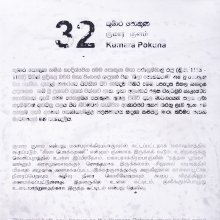Punga, Puṅga, Pumga: 8 definitions
Introduction:
Punga means something in Hinduism, Sanskrit, biology. If you want to know the exact meaning, history, etymology or English translation of this term then check out the descriptions on this page. Add your comment or reference to a book if you want to contribute to this summary article.
Images (photo gallery)
Biology (plants and animals)
Source: Google Books: CRC World Dictionary (Regional names)1) Punga in Congo is the name of a plant defined with Milicia excelsa in various botanical sources. This page contains potential references in Ayurveda, modern medicine, and other folk traditions or local practices It has the synonym Chlorophora tenuifolia Engl. (among others).
2) Punga in India is also identified with Pongamia pinnata It has the synonym Cajum pinnatum Kuntze (etc.).
3) Punga in Latin America is also identified with Pachira glabra It has the synonym Bombax insigne Wall. (etc.).
Example references for further research on medicinal uses or toxicity (see latin names for full list):
· Rendic. Acc. Nap. (1868)
· Flore Forestière de la Cochinchine (1899)
· Contribution à l’Ethnographie des Kuta. (1974)
· Voyage autour du Monde, entrepris par Ordre du Roi, … éxécuté sur les Corvettes de S. M. l’Uranie et la Physicienne … Botanique (1826)
· Flora of Bilaspur District, Madhya Pradesh (1989)
· Recent Res. Pl. Sci.. (1979)
If you are looking for specific details regarding Punga, for example health benefits, extract dosage, side effects, chemical composition, pregnancy safety, diet and recipes, have a look at these references.

This sections includes definitions from the five kingdoms of living things: Animals, Plants, Fungi, Protists and Monera. It will include both the official binomial nomenclature (scientific names usually in Latin) as well as regional spellings and variants.
Languages of India and abroad
Sanskrit dictionary
Source: DDSA: The practical Sanskrit-English dictionaryPuṅga (पुङ्ग).—A heap, collection, multitude.
Derivable forms: puṅgaḥ (पुङ्गः), puṅgam (पुङ्गम्).
Source: Cologne Digital Sanskrit Dictionaries: Shabda-Sagara Sanskrit-English DictionaryPuṅga (पुङ्ग).—mn.
(-ṅgaḥ-ṅgaṃ) A heap, a collection, a quantity. E. puṃ man, gama to go, aff. ḍa .
Source: Cologne Digital Sanskrit Dictionaries: Monier-Williams Sanskrit-English DictionaryPuṅga (पुङ्ग):—mn. a heap, collection, quantity (cf. puñja), [cf. Lexicographers, esp. such as amarasiṃha, halāyudha, hemacandra, etc.]
Source: Cologne Digital Sanskrit Dictionaries: Yates Sanskrit-English DictionaryPuṅga (पुङ्ग):—[pu-ṅga] (ṅga-ṅgaṃ) 1. m. n. A heap, a quantity.
[Sanskrit to German]
Sanskrit, also spelled संस्कृतम् (saṃskṛtam), is an ancient language of India commonly seen as the grandmother of the Indo-European language family (even English!). Closely allied with Prakrit and Pali, Sanskrit is more exhaustive in both grammar and terms and has the most extensive collection of literature in the world, greatly surpassing its sister-languages Greek and Latin.
Kannada-English dictionary
Source: Alar: Kannada-English corpusPuṃga (ಪುಂಗ):—[noun] = ಪುಂಖಿ [pumkhi].
Kannada is a Dravidian language (as opposed to the Indo-European language family) mainly spoken in the southwestern region of India.
See also (Relevant definitions)
Starts with (+22): Pukkanca, Punga maram, Pungai, Pungakta, Pungala, Pungalavela, Pungale, Pungali, Pungalio, Pungam, Pungam-maram, Pungamaram, Pungammaram, Punganchedi, Pungapung, Pungar vel, Pungarei, Pungari, Pungata, Pungav.
Ends with: Bapunga, Chelum punga, Epunga, Hundipunga, Mpunga, Mpungapunga.
Full-text: Punga maram, Chelum punga, Punkavanam, Punkollai, Pungi, Punja, Punkam.
Relevant text
No search results for Punga, Pu-nga, Pu-ṅga, Pumga, Puṃga, Puṅga; (plurals include: Pungas, ngas, ṅgas, Pumgas, Puṃgas, Puṅgas) in any book or story.


